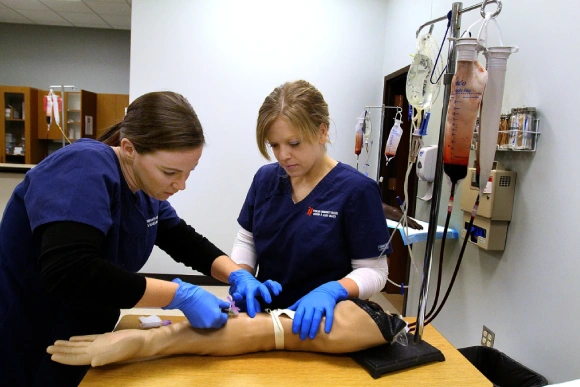Specialized Medical Assistants take the general role of a CCMA further, working in a specialist’s office. A specialist is a physician that goes to school for an additional period of study to focus on a specific condition or issue.
For example, a Cardiologist is a specialist of the heart and cardiovascular system. To the Medical Assistant, this means understanding more about the functions of the heart, how to recognize potential symptoms of heart problems and more. Medical Assistants may secure a position in a day surgery environment. Here a Medical Assistant is likely to assist with preparations before the surgery and post operation room surgery set ups.
Assistants that complete the program may also choose to become a Phlebotomy Technician or a Laboratory Assistant. Although these positions fulfill different needs, they share a commonality. Both work in a laboratory setting in some form. However, the Phlebotomy Technician is more focused on the work of drawing blood and collecting specimens. Meanwhile, the Laboratory Technician may clean equipment, submit samples to Laboratory Scientists for additional testing, prepare reports and more. In smaller facilities, the duties of these positions may be combined, so Medical Assistants can tackle both roles at once.
A sub-position of the lab-based roles is the Blood Donor Phlebotomist. This Phlebotomist works in blood-donor facilities, establishing venous access and monitoring blood donors while the machine collects the specimen. Blood is always in-demand, and Medical Assistants that tackle this position will definitely make a difference and save lives.
Recommended for you
-
Medical Assistant Program
Take our accelerated Medical Assistant with Clinical Labs program at our Arlington campus and start a new career in as little as 8 months!
Radiology Technician Training
Take our accelerated Radiology Technician Training program at our Arlington campus and start a new career in as little as 8 months!
Medical Assistant Program
Our 100% online fast track Medical Assistant program makes it possible for you to train for a new career in as little as 6 months!
Other potential positions include Clinical Coordinators, performing office functions to manage the schedules of employees and patients. The EKG Technician may be used in any health care facility, especially those focused on cardiovascular health.
Chiropractic Assistants work under a Chiropractor, performing clerical duties, teach patients how to perform exercises to promote healing and more.
Ophthalmic Assistants take the role of Medical Assistant into the Optometrist’s or Ophthalmologist’s office. There’s much more than meets the eye when caring for the eyes, so Medical Assistants can provide a wealth of support in this position. They may serve in administrative purposes, begin basic eye exams, prepare patients for surgical procedures and more.
Martin Zandi

Related Articles






















